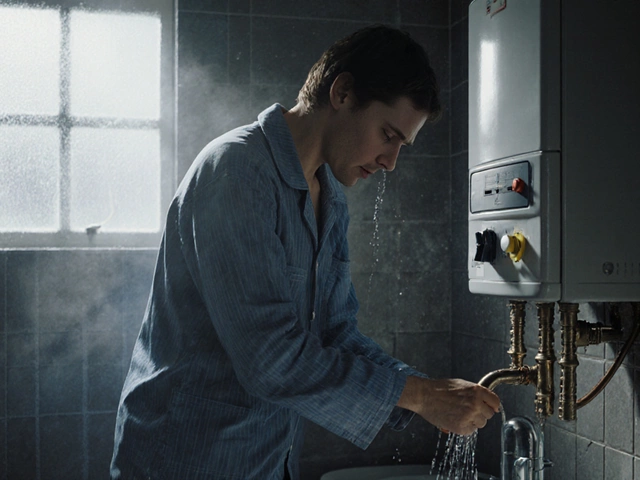So, your microwave's on the fritz and someone throws the word 'magnetron' at you. What is this mysterious piece of tech, and is it really worth replacing? Well, you're in the right place to figure that out. Let's break it down.
First things first, the magnetron is what makes your microwave actually, well, microwave. It's the gadget that generates those microwaves that cook your food. Without it, you're looking at a very fancy, overpriced bread box.
You might be asking yourself, how do I even know if my magnetron's toast? Spotting the signs can be simple: your food isn’t heating evenly, the microwave hums suspiciously, or worst case, nothing happens at all when you try to heat up leftovers. If you’re seeing any of these red flags, it might be time to consider a replacement.
- Understanding the Magnetron
- Signs Your Magnetron Might Be Failing
- Cost Implications of Replacement
- DIY Replacement vs Professional Repair
- When to Consider a New Microwave
Understanding the Magnetron
If you've ever wondered what really makes your microwave tick, it's all about the magnetron. This is the heart of the appliance where the magic happens. A magnetron is a type of electron tube that creates the microwave radiation used to cook or heat food. It was invented back in the 1940s and revolutionized cooking. How’s that for a slice of history?
So, how does it work? The magnetron takes high voltage electricity and converts it into those microwaves we need. These microwaves then bounce around inside the metal interior of your microwave oven. As they hit your food, they make the molecules in the food heat up. Pretty neat, right?
How the Magnetron Impacts Microwave Performance
When we talk about microwaves heating unevenly, it's often the magnetron's fault. If it’s functioning well, your food heats evenly and quickly. But if the magnetron's on its last legs, you might start to notice longer cooking times or cold spots in your meals.
Common Signs of Magnetron Failure
Watch out for these signs of trouble: a louder-than-usual humming noise, the smell of burning, or the frustrating experience of food staying cold. A burnt-out magnetron might also cause your microwave to stop working altogether. Not fun when you're hungry and impatient!
If you're thinking about replacing it, be aware that sometimes it's not just about swapping out one part. Older microwave repair jobs might not be worth it in the long run if the rest of the appliance is on the way out.
Signs Your Magnetron Might Be Failing
Your microwave's magnetron can be tricky to figure out, but there are some clear indicators that it's on its last legs. Let's break down what you should be looking for before jumping into the idea of a magnetron replacement.
Noticeable Noise Changes
If your microwave suddenly starts making different, high-pitched humming or buzzing sounds, it's time to pay attention. A failing magnetron often sings a sad tune before it gives up entirely. It's like when your car's engine clatters—never a good sign.
Ineffective Heating
You're impatiently waiting for your popcorn, but it’s lukewarm and barely popping. Or maybe yesterday's lasagna is coming out as icy as it went in. If food isn’t heating properly or consistently, your magnetron could be on the fritz. This is a top indicator in the world of microwave repair.
Burn Marks or Smells
Ever notice a burning smell or scorch marks inside your microwave? A malfunctioning magnetron can create hotspots, which might damage the interior. This could lead to further complications if ignored, not to mention being a potential fire hazard.
Non-Functioning Microwave
If your microwave has tech-like refusal to do its one job—heat things—you might be dealing with a faulty magnetron. A microwave that powers on but doesn't do anything useful indicates a serious issue.
DIY Testing
If you're a little handy, you might try testing the magnetron yourself. Disconnect the power, remove the outer casing, and use a multimeter to check for continuity in the magnetron. But, word of caution: Mishandling can be dangerous, so this is only for those comfortable around electronics.
Spotting these signs early can save you the hassle and potential cost of buying an entirely new appliance. A professional assessment is recommended before making any major decisions on replacements or repairs.

Cost Implications of Replacement
Now, let’s talk dollars and cents. Replacing a magnetron isn't just about finding a compatible part; it also impacts your wallet. On average, a new magnetron can cost anywhere from $50 to $100, depending on the brand and model of your microwave. The price might even climb higher if you go for top-notch brands that promise longer durability.
But wait, that's not all. You also need to consider labor costs if you're not the DIY type. This can tack on an extra $100 to $200, possibly more depending on the repair service. When you add it all up, you could be looking at spending nearly the same amount as a brand-new microwave, which often starts at around $100 for basic models.
Is It Worth Hiring a Professional?
If you choose to hire someone, make sure they're certified and have experience with your specific microwave brand. You don't want to pay for a botched job, right? Some repair services offer guarantees or warranties on their repairs, which might offer peace of mind but could be more expensive.
- DIY: Cost of magnetron alone, about $50-$100.
- Professional Repair: Magnetron plus labor, $150-$300.
The costs can vary significantly based on your location and the age of your microwave, so it's wise to get multiple quotes if you're hiring out. For high-end models, replacing the magnetron might still be cheaper than buying new. But for older or mid-range microwaves, it might not be the sensible option.
Before you decide, weigh these costs against the age and reliability of your current machine. If your microwave is already quite the senior citizen, investing in a replacement part might only delay the inevitable need for a new unit. However, if it's relatively new, a magnetron replacement could breathe new life into it.
DIY Replacement vs Professional Repair
First, let's talk about DIY replacement. It’s tempting to think you can save a few bucks by handling the magnetron replacement yourself. If you're pretty handy and have some experience with appliance repair, it might be doable. However, keep in mind this is not like changing a light bulb. You'll need to deal with electrical components, and there's a risk of electric shock if you're not careful.
If you're set on going the DIY route, make sure to unplug the microwave and discharge the capacitor first. You'll find most magnetrons tucked behind panels that you’ll need to remove with a screwdriver. Before diving in, definitely consult your microwave's manual or a reliable online resource tailored to the make and model of your microwave.
Benefits of Professional Repair
Hiring a pro can often be the safer and less stressful option. Sure, it might cost a bit more upfront, but it comes with peace of mind. A qualified technician not only replaces the magnetron but also checks other components to ensure everything's in top shape. Plus, repair services usually offer warranties on their work, which is something a DIY repair can't promise.
Here's where the costs come into play. A new magnetron can set you back anywhere from $50 to $100, but a professional repair service might charge $100 to $200 including labor. This may seem steep, but factor in the time saved and potential headache avoided, and it kind of balances out.
Deciding Which Route to Take
- If your microwave is a pricier model, it might be worth fixing professionally to extend its lifespan.
- For older or cheaper models, replacement costs might creep dangerously close to the price of a brand-new microwave.
- Consider your comfort level with handling electrical repairs. Just because it's possible to DIY doesn’t mean it’s the best choice for everyone.
Essentially, weigh the costs and your confidence with tech repairs. If you have any doubts, leaning towards professional repair could likely save you a heap of trouble later.

When to Consider a New Microwave
Alright, so you've noticed the issues with your microwave. But when does it make sense to ditch it for a new one instead of spending cash on a magnetron replacement? Here are some signs that point to door number two: the shiny new microwave.
Age Matters
First up, consider the age of your appliance. Most microwaves have a lifespan of about 7 to 10 years. If yours is creeping close to or beyond that range, it might be time to say goodbye. Technology's evolved quite a bit; new models could save you energy and money in the long run.
Repair Costs Add Up
If you've gotten an estimate for repair and the cost is over 50% of what you'd pay for a new microwave, you're probably better off investing in a new gadget. Microwaves aren't like pets; there's no point sinking more money than they're worth into extending their life.
New Features Are Tempting
Let's face it, today's microwaves come packed with features that your old model can only dream of, like smart sensors and inverter technology. If these goodies have you drooling, it might be worth upgrading for the perks. Imagine perfectly defrosted chicken every time!
Frequent Breakdowns
Your trusty old microwave isn’t so trusty if it's constantly breaking down. Frequent repairs signal bigger underlying issues and, let's be honest, a brand new microwave will save you from hassle.
You Need More Efficiency
Newer microwaves are designed to be more energy-efficient and if you notice a spike in your electricity bill every time you heat leftovers, a new appliance could help curb that. Going green has its perks!
| Factor | Consideration |
|---|---|
| Age | Older than 7 years? Think upgrade. |
| Repair Cost | If repairs are 50% the cost of new, it’s time for an upgrade. |
| Features | Modern perks worth the leap? Go for it. |
| Breakdowns | Recurring issues suggest a new purchase. |
| Efficiency | New models can lower energy bills. |
So next time you're staring at your underperforming microwave, you might realize that a microwave repair just isn't worth it, and it’s time to enjoy the convenience and efficiency of an upgraded appliance.







